Now more than ever, Knights of the Old Republic is a refreshing take on Star Wars
Revisiting BioWare's classic RPG in a post-Mandalorian world.
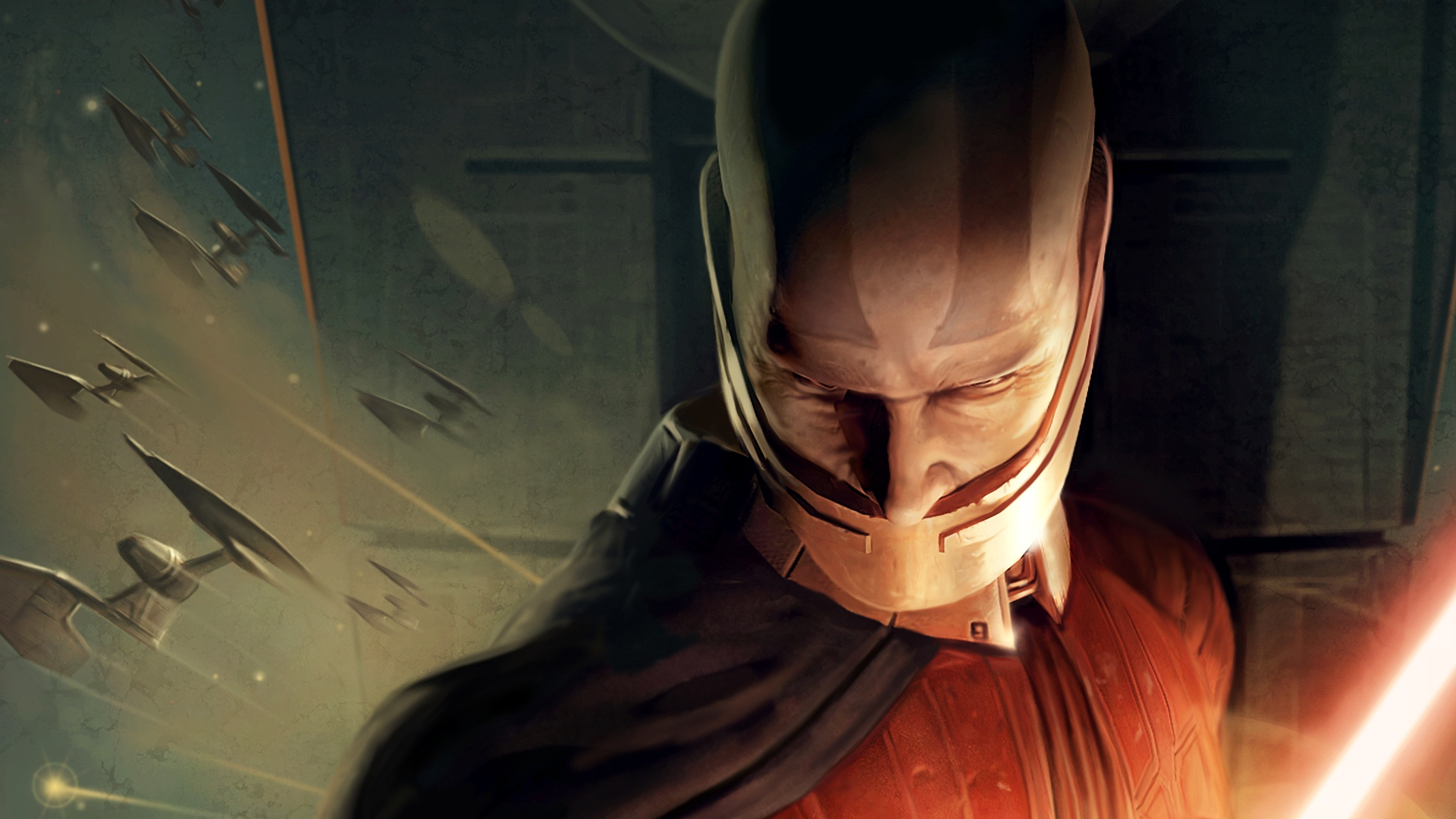
With rumors of a KOTOR remake circling, we're revisiting this retrospective from back in January.
Like many people, I recently finished season 2 of The Mandalorian and was left with a powerful hunger for more Star Wars in any form. I rewatched the original trilogy, read a selection of graphic novels and books (including Steve Perry's brilliant Shadows of the Empire), and—and best of all—decided to replay BioWare's classic Star Wars RPG, Knights of the Old Republic.
The last time I played KOTOR was around the time of its UK release in the autumn of 2003, and it was the perfect antidote to the prequel trilogy. George Lucas was two films deep by this point. Attack of the Clones was released the year before and I was not a fan, to put it mildly. But here was this videogame, set four thousand years before Luke Skywalker, Darth Vader, and the Death Star, reminding me of why I loved Star Wars in the first place. A rare, thrilling chance to experience the unseen history of my favourite fictional universe.
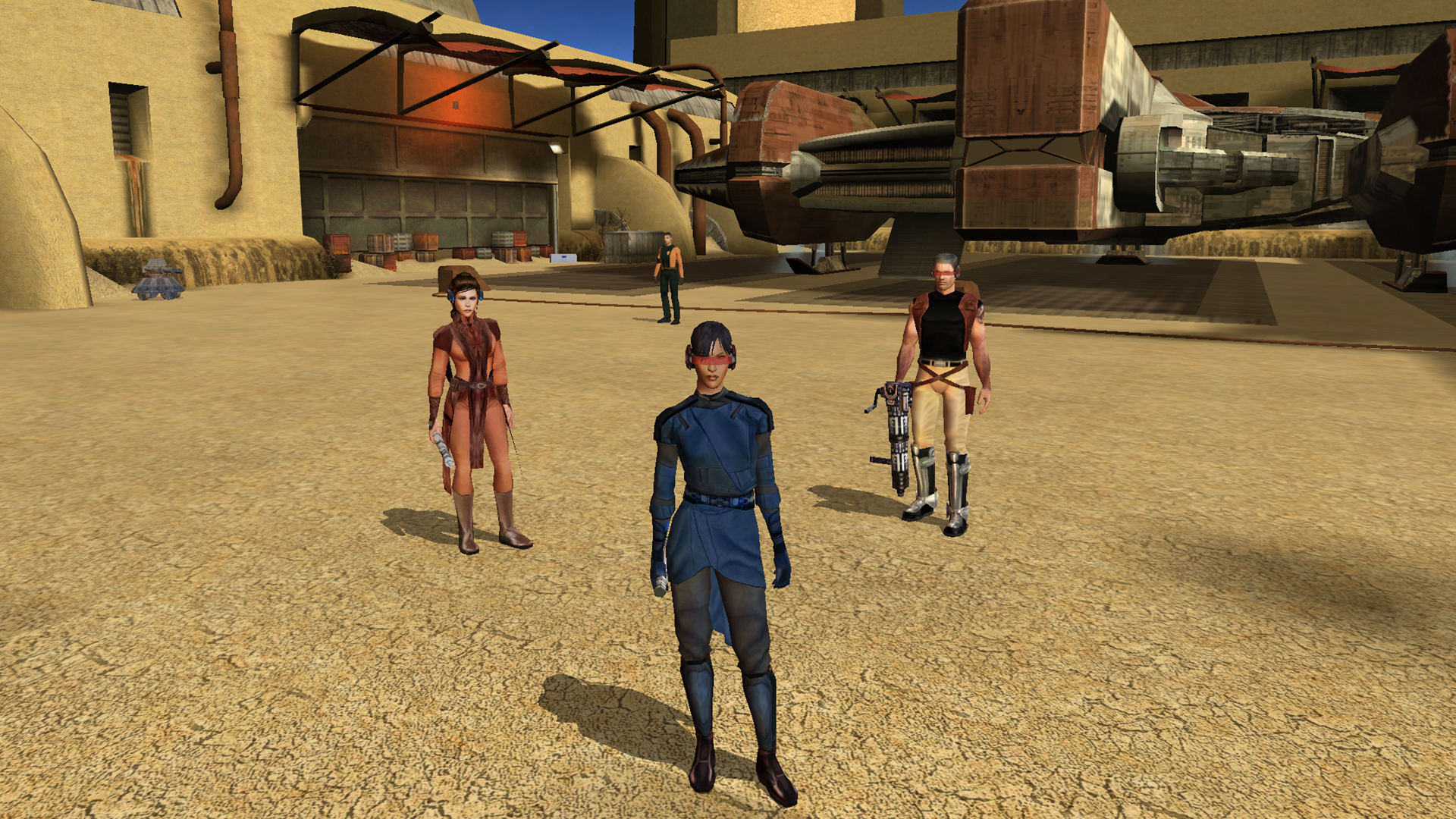
Today, after years spent drifting in the pop culture Dune Sea, Star Wars is in a very different place. A whole new film trilogy has been and gone, along with several spin-offs. The series successfully made the jump to the small screen, including the aforementioned Mandalorian, which is the most I've enjoyed a Star Wars thing in ages. And owner Disney just recently announced a galaxy's worth of new movies, books, and TV shows. Honestly, it's a bit much.
The Force Awakens landed so perfectly because it had been years since the last good Star Wars film. Rise of Skywalker, by most accounts, did not—not only because it was a cowardly retcon of The Last Jedi and ultimately just a bad, confused film, but because people were sick of Star Wars, at least in its traditional form. I went to a midnight screening of Awakens, and I didn't even bother seeing Rise on the big screen. So as much as I enjoyed The Mandalorian, which reignited my passion for the series in a big way, I wondered if by installing KOTOR I was at risk of reaching Star Wars overload once again.
What sets BioWare's game apart, even after all this time, is where it sits on the timeline.
But what sets BioWare's game apart, even after all this time, is where it sits on the timeline. Most of the Star Wars stories being told today revolve around the Skywalker clan and other events from those nine films. Even The Mandalorian, which did a good job of carving its own path through the galaxy, succumbed to the temptation—particularly in the latter half of season 2. But by throwing you way, way back to the days of the Old Republic, KOTOR gives you a fresh perspective on this universe, letting you witness its rich and storied history first-hand.
When the game begins, the Republic is at war with the Sith, led by the evil Darth Malak. The Jedi have been left scattered and vulnerable, with many turning to the Dark Side and joining Malak's growing army. And that's where you come in, a hero with a mysterious past who joins the dwindling Jedi Order and embarks on a quest to stop Malak and his powerful Sith fleet. Those are the broad strokes, but things get a lot more complicated—especially when the protagonist learns, in a very Star Wars twist, a shocking truth about their past.
Keep up to date with the most important stories and the best deals, as picked by the PC Gamer team.
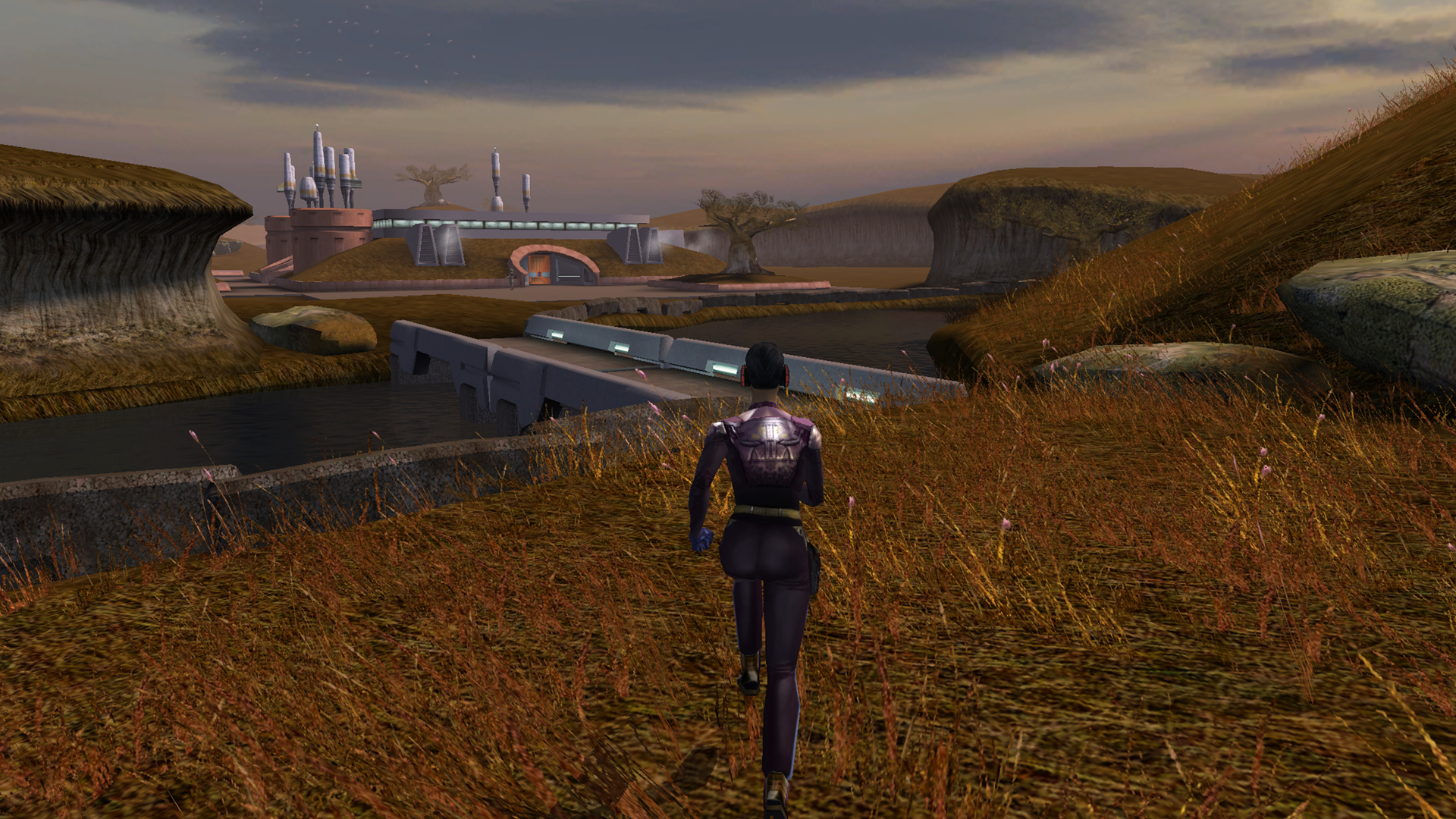
Of course, there's the question of canon. It's a great story, but did it 'really' happen? Another big change that occurred between KOTOR's release and now is that the events of the game may no longer be part of the main Star Wars continuity. When Disney snapped up Star Wars they categorised this game, and countless other Star Wars spin-offs from the so-called expanded universe, as Legends. That said, some things BioWare created for KOTOR—the planet Taris, card game Pazaak, and the Selkath race, to name just a few—have appeared in projects that are considered canon. So the whole situation is a little unclear. There's also a rumour flying around that Shutter Island screenwriter Laeta Kalogridis is working on a KOTOR movie for Disney, so maybe this story, if the film sticks closely to it, will be canon after all.
Really, it doesn't matter. Just because the short story anthology Tales of the Bounty Hunters is as non-canon as it gets doesn't mean it isn't still a fun collection of Star Wars yarns. And even though we now know it was Jyn Erso, not Kyle Katarn, who stole the plans for the first Death Star from the Empire, Dark Forces remains a superb Star Wars game. Some fictional universes benefit from a consistent, traceable timeline, but Star Wars is like a myth, a fairytale, and that makes this less important. Who really knows what happened four thousand years ago? KOTOR is just one possible version of those events.
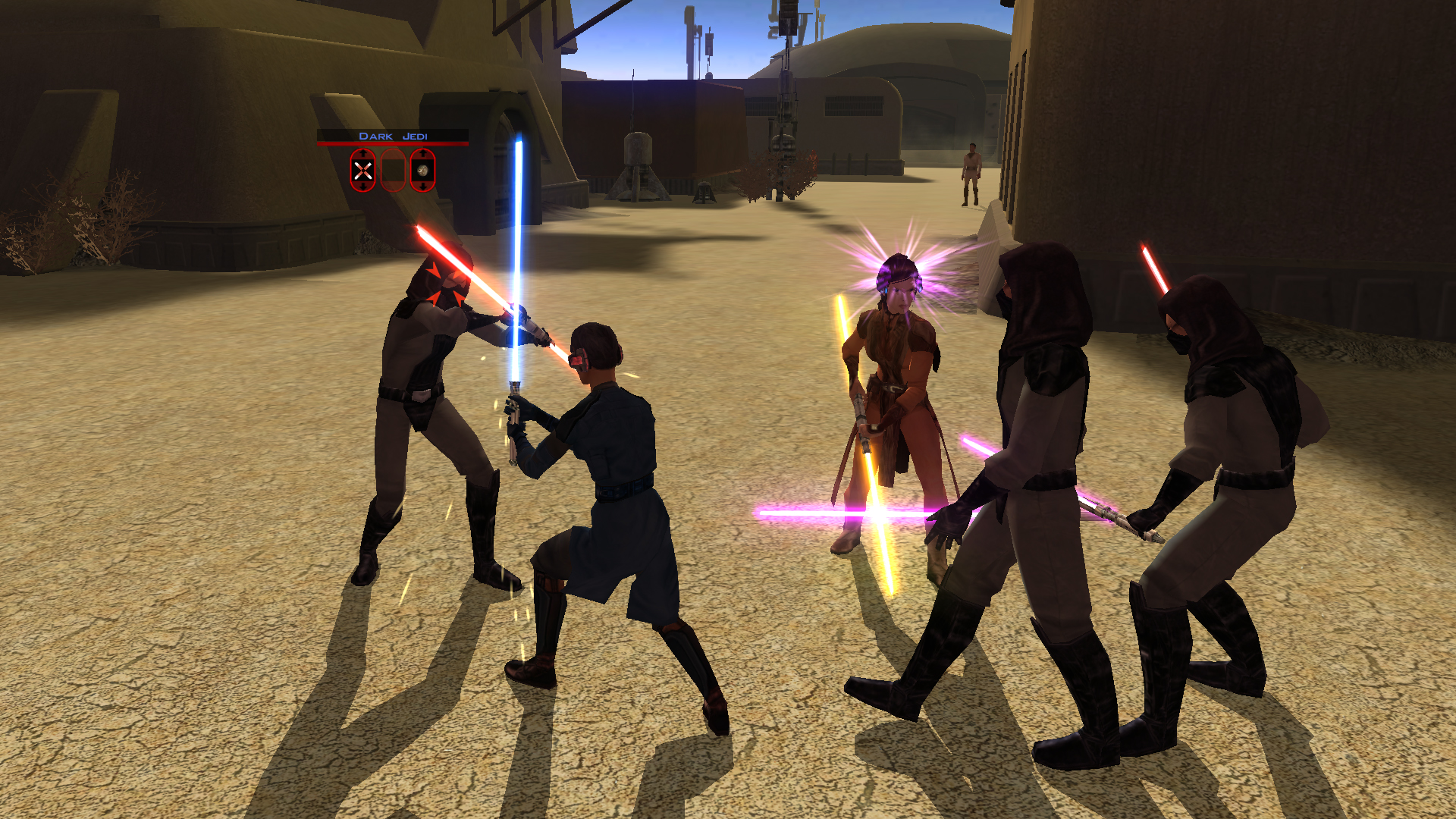
However, despite the chronological gulf, KOTOR still has plenty to scratch any Star Wars itch you might develop. If anything, BioWare made its take on the universe a little too similar to classic Star Wars—especially considering the amount of time that's supposed to have passed between this game and the original trilogy. But I'll let it slide, because the established language of Star Wars—blasters, speeders, astromech droids, cocky smugglers, pious Jedi, and so on—lays a familiar foundation to tell this new story on. BioWare could have created something completely different and alien, and I'm sure they would have done a great job of it, but it might not have felt very Star Wars.
And even though some of the lore established by the game has since been contradicted by Jon Favreau and Dave Filioni's TV show, a heavy Mandalorian presence makes KOTOR particularly enjoyable if you've just finished watching the adventures of Din Djarin and his tiny green Force sensitive friend. At this point in time the Mandalorians have just lost a war, scattering their clans around the galaxy. You run into a few of them, including a gladiator named Bendak Starkiller (no relation to the hero of The Force Unleashed), and Sherruk, the powerful leader of a gang of raiders, who loves nothing more than defeating Jedi in battle and collecting their lightsabers as trophies.
Like The Mandalorian, most of KOTOR is set in the Outer Rim.
You also party up with a Mandalorian: grouchy war vet Canderous Ordo, whose Dark Side alignment makes him an ideal companion for anyone role-playing as such. And if not, he always has a sarcastic remark ready when you follow the Jedi Code and deny a reward for doing a good deed. Turning down credits gets him particularly hot and bothered. I also like BioWare's take on what Mandalorian armour might have looked like thousands of years ago. It's very different, but the T-shaped visor is a nice visual link to the Beskar gear we're used to seeing worn by the likes of Boba Fett and Bo-Katan.
And like The Mandalorian, most of KOTOR is set in the Outer Rim—the wild, remote, often lawless part of the galaxy where all the best Star Wars stories take place. Taris, the first planet you visit, is like a rougher Outer Rim take on Coruscant: a planet-sized metropolis plagued by crime and ruled by ruthless swoop bike gangs. You also get to visit the quiet agrarian planet of Dantooine, which Princess Leia mentions briefly in A New Hope, and find it besieged by Mandalorian raiders looking for something to do now that they don't have a war left to fight. And, of course, there's a stop at Tatooine, the most significant planet in the entire Star Wars mythology, whose surface is being strip-mined by Czerka, a megacorporation in the pocket of the Sith.
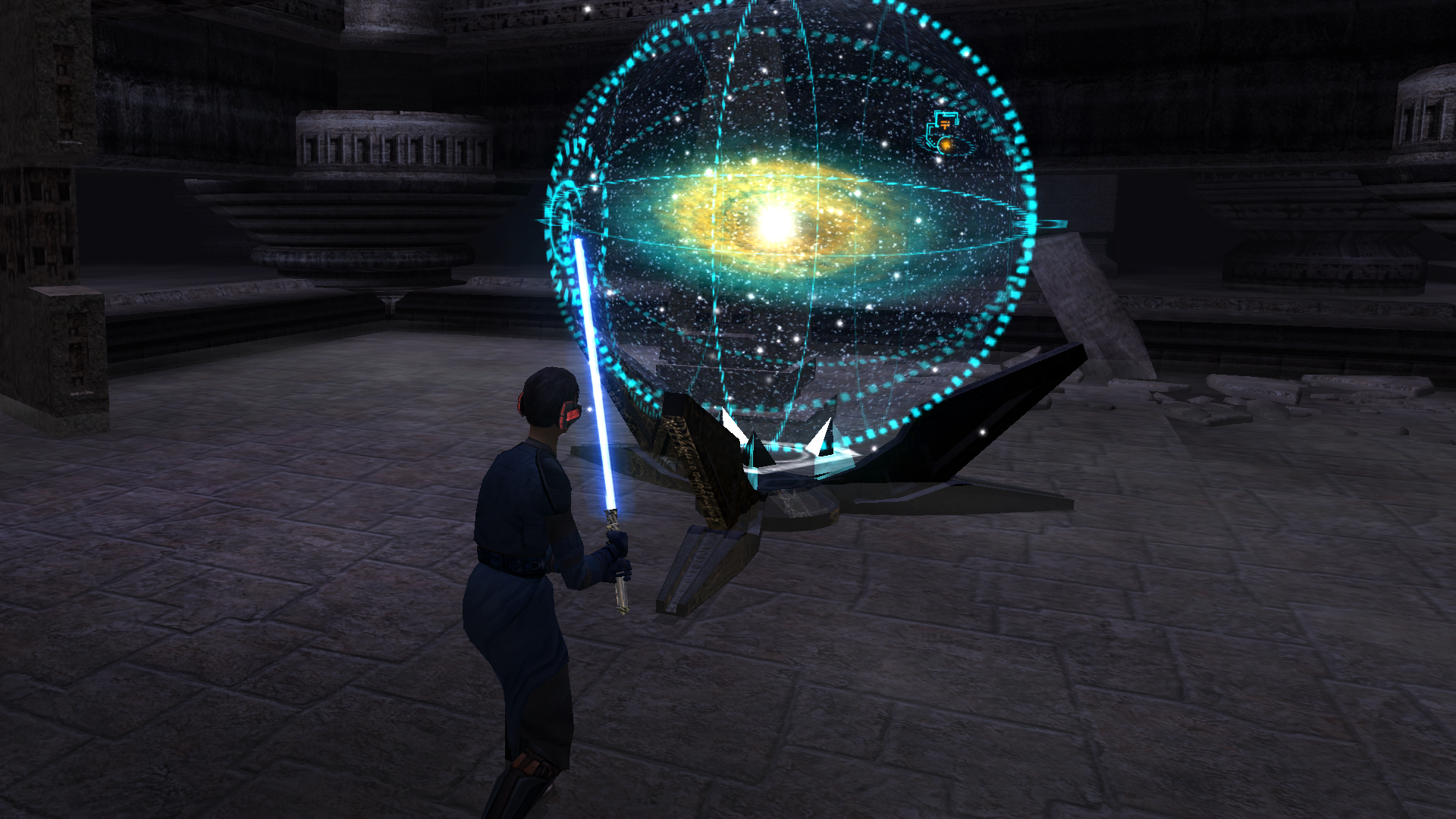
But is it still fun to play? KOTOR regularly makes lists of the best Star Wars games (including our own), but I often wondered how much of that was fuelled by nostalgia. So I was glad to discover that, while rough around the edges, it remains a great RPG. The environments are nicely varied, with compelling self-contained stories relevant to each world's politics and history. The personal journey of the hero, and how they handle that big revelation, is well written and emotionally impactful. The companions are memorable; both in their interactions and how they respond to your decisions. It's undeniably clunky, with a messy UI and stiff animation, but the challenging combat, reactive quests, and strong, characterful writing absolutely hold up.
And the good news is, it runs fine on modern PCs. To play in higher resolutions you'll need to do some modding, but it's a simple process. Check out the game's entry on the PC Gaming Wiki for instructions. And it's definitely worth reinstalling, even if you're burned out on Star Wars. KOTOR is detached enough to still feel like an excitingly fresh take on the source material—which is a weird thing to say about a game that came out when George W. Bush was President. But with Disney still sticking closely to that same familiar pool of characters and events, KOTOR's distance from them is worth celebrating even more.
If it’s set in space, Andy will probably write about it. He loves sci-fi, adventure games, taking screenshots, Twin Peaks, weird sims, Alien: Isolation, and anything with a good story.


